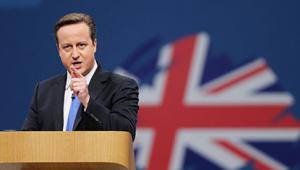By Richard Johnstone | 22 November 2011
Cutting the UK’s deficit is proving ‘harder than anyone envisaged’, Prime Minister David Cameron has admitted in a speech to business leaders.
Addressing the CBI annual conference in London yesterday, Cameron acknowledged that growth in Britain was slow, and that there were ‘real’ fears for the future of the economy caused by the eurozone crisis.
Cameron was speaking as figures from the Office for National Statistics announced that public sector net borrowing for October was £6.5bn, down from £7.7bn a year ago.
The prime minister insisted that ‘dealing with government deficits must be line one of our plan for recovery’ ahead of the Autumn Statement from Chancellor George Osborne next week.
He said: ‘Yes, getting debt under control is proving harder than anyone envisaged. High levels of public and private debt are proving to be a drag on growth, which in turn makes it more difficult to deal with those debts.’
Cameron told the business lobby that the ‘biggest immediate boost’ to UK growth would be a ‘clear resolution’ of the eurozone crisis. He blamed the problems on ‘markets [that] are not convinced that eurozone countries are able to pay their debts’. Britain had avoided the difficulties faced by Greece and Italy, he added, because of its deficit reduction plan.
The prime minister paved the way for an announcement next week that would make it easier for businesses to borrow. He promised that the government would ‘unblock’ markets to ‘get credit flowing again’.
Acknowledging that companies wanting to borrow money still face a ‘nightmare’ to get approved, Cameron said: ‘That’s why next week the chancellor will say more about plans for a new credit easing scheme. This will use the strength of the government’s balance sheet to pump billions of pounds into reducing the cost of loans for small and medium-sized businesses.’
Osborne’s statement on November 29 will also set out plans to ‘transform the nation’s infrastructure’, Cameron said. This comes after calls from the CBI for the introduction of road tolls to help pay for road improvements.
But the Reform think-tank warned today that the ‘siren call’ of infrastructure construction should be resisted as a way to create jobs.
In a report, The long game, it argues that modern infrastructure projects are capital-intensive and largely employ skilled labour, so are unlikely to have an immediate effect on unemployment.
It adds: ‘Shifting forward infrastructure spending increases the risk of the wrong project being pursued, [and] building “white elephants”.’
The think-tank urges the chancellor to ‘hold his nerve in the face of a recovery which must be slow and difficult’. It adds that slow growth is ‘inevitable’ given the levels of debt in the economy before the recession, which also means that the government’s austerity programme might need to be extended to 2020.



Cutting the UK’s deficit is proving ‘harder than anyone envisaged’, Prime Minister David Cameron has admitted in a speech to business leaders.
Addressing the CBI annual conference in London yesterday, Cameron acknowledged that growth in Britain was slow, and that there were ‘real’ fears for the future of the economy caused by the eurozone crisis.
Cameron was speaking as figures from the Office for National Statistics announced that public sector net borrowing for October was £6.5bn, down from £7.7bn a year ago.
The prime minister insisted that ‘dealing with government deficits must be line one of our plan for recovery’ ahead of the Autumn Statement from Chancellor George Osborne next week.
He said: ‘Yes, getting debt under control is proving harder than anyone envisaged. High levels of public and private debt are proving to be a drag on growth, which in turn makes it more difficult to deal with those debts.’
Cameron told the business lobby that the ‘biggest immediate boost’ to UK growth would be a ‘clear resolution’ of the eurozone crisis. He blamed the problems on ‘markets [that] are not convinced that eurozone countries are able to pay their debts’. Britain had avoided the difficulties faced by Greece and Italy, he added, because of its deficit reduction plan.
The prime minister paved the way for an announcement next week that would make it easier for businesses to borrow. He promised that the government would ‘unblock’ markets to ‘get credit flowing again’.
Acknowledging that companies wanting to borrow money still face a ‘nightmare’ to get approved, Cameron said: ‘That’s why next week the chancellor will say more about plans for a new credit easing scheme. This will use the strength of the government’s balance sheet to pump billions of pounds into reducing the cost of loans for small and medium-sized businesses.’
Osborne’s statement on November 29 will also set out plans to ‘transform the nation’s infrastructure’, Cameron said. This comes after calls from the CBI for the introduction of road tolls to help pay for road improvements.
But the Reform think-tank warned today that the ‘siren call’ of infrastructure construction should be resisted as a way to create jobs.
In a report, The long game, it argues that modern infrastructure projects are capital-intensive and largely employ skilled labour, so are unlikely to have an immediate effect on unemployment.
It adds: ‘Shifting forward infrastructure spending increases the risk of the wrong project being pursued, [and] building “white elephants”.’
The think-tank urges the chancellor to ‘hold his nerve in the face of a recovery which must be slow and difficult’. It adds that slow growth is ‘inevitable’ given the levels of debt in the economy before the recession, which also means that the government’s austerity programme might need to be extended to 2020.




















